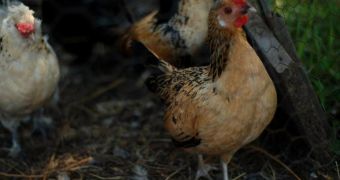Scientists are reporting an unusual condition among chicken grown in Australia. They say that the viruses introduced in the poultry in small amounts, as part of a vaccination campaign, appear to have recombined inside the animals, leading to a severe type of infection.
As the new organism starts to attack the chicken, the latter get sick, and die soon afterwards. The condition has thus far only been detected in vaccinated chicken. Researchers believe that such campaigns should be carried out more carefully, in order to avoid such disastrous consequences.
The main thing about vaccines is that they should prevent diseases from occurring, not cause them. They work by introducing a small amount of a particular virus in the body. The immune system picks up the intruder and destroys it, creating the antibodies necessary for doing so in the process.
Then, if the same virus tries to invade – such as during an epidemic – the body is immune to its effects, and makes short work of the pathogen. In the case of animals grown intensively at a large scale, several vaccines are often administered at the same time, Science Now reports.
The chance of the tiny amounts of viruses introduced by these vaccines meeting and putting their genetic material in common is very low, yet not non-existent, as the new situation clearly demonstrates.
“This shows that recombination of such strains can happen and people need to think about it,” explains researcher Glenn Browning, who holds an appointment as a veterinary microbiologist at the University of Melbourne, in Parkville, Australia.
He is also one of the coauthors on a new paper describing the findings. The work, entitled “Attenuated Vaccines Can Recombine to Form Virulent Field Viruses,” appears in the July 13 issue of Science.
The situation currently present in Australia may have stemmed from the fact that the country imported a series of European vaccines back in 2006. Before that, farmers were using Pfizer's SA2 and A20 attenuated herpesvirus vaccines.
These herpesviruses cause infectious laryngotracheitis (ILTV) in chicken, killing about 20 percent of infected individuals. Some 2 years after the European version of the vaccine was imported, new strains of the herpesviruses appeared, which showed genetic characteristics from both the Australian and European versions.
At this point, experts are still trying to establish how the recombination between the two strains occurred. This would have required both vaccines to be injected in the same chicken, which farmers do not usually do.

 14 DAY TRIAL //
14 DAY TRIAL //